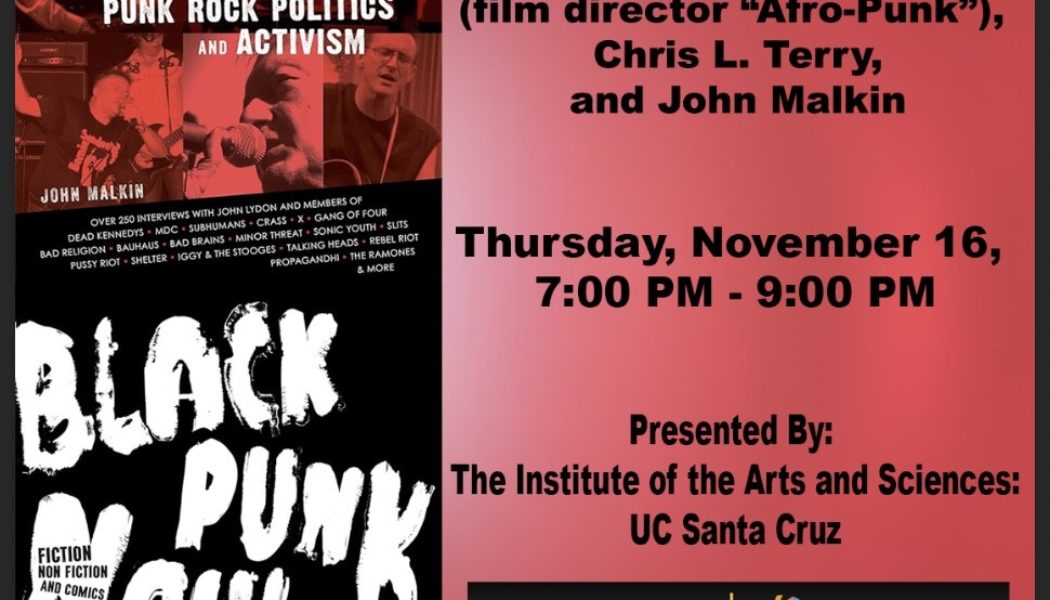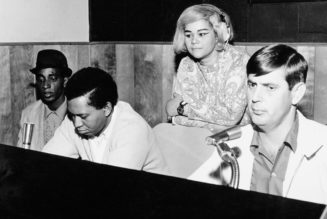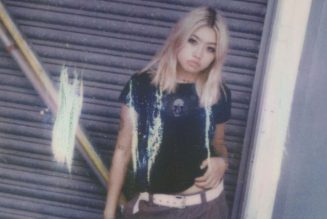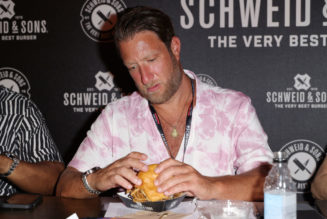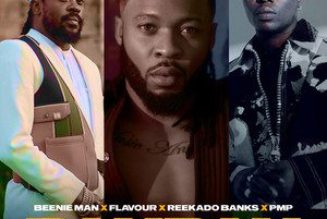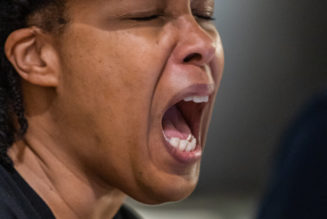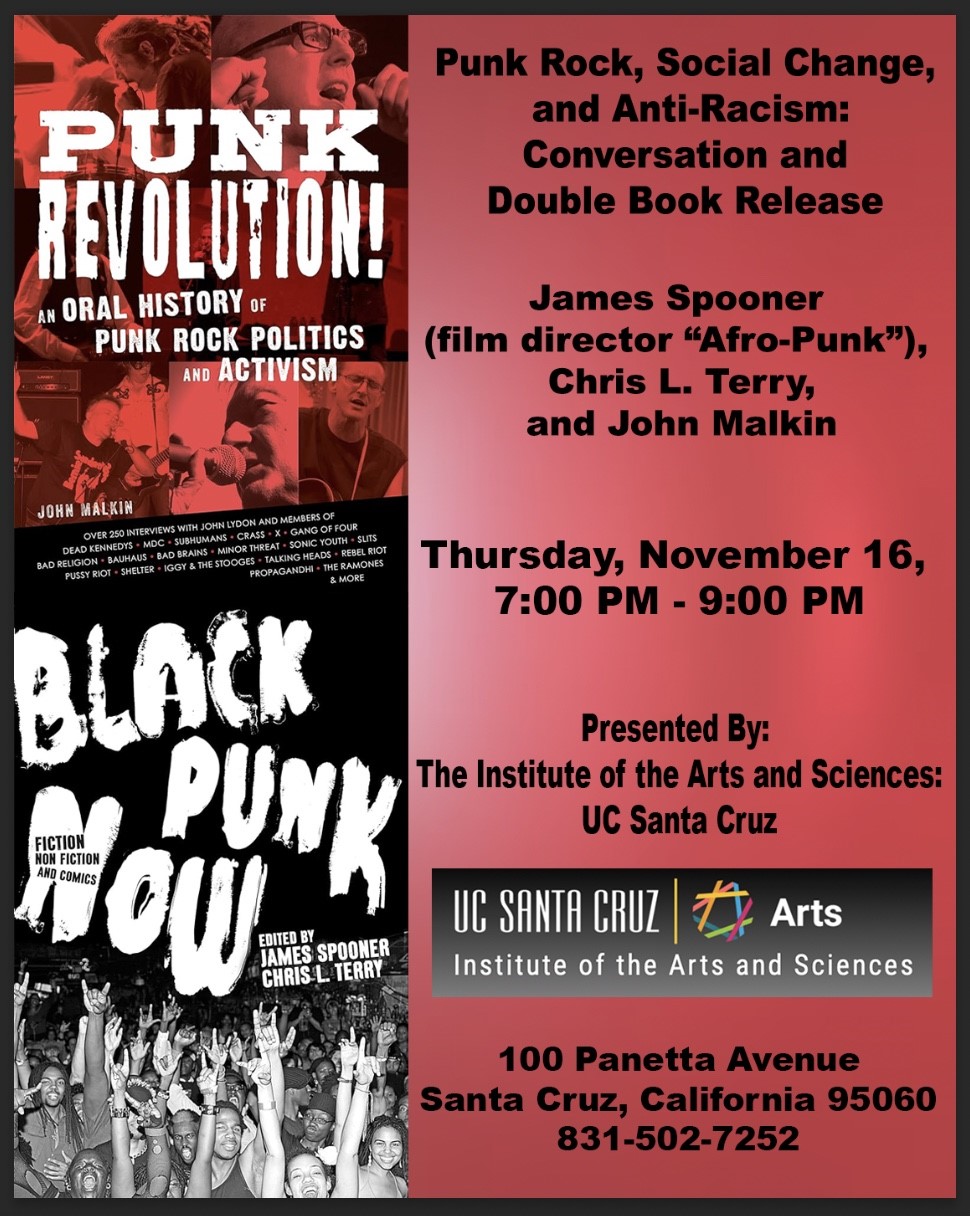
SANTA CRUZ — From the beginning, a common theme throughout punk rock has been rebelling against the status quo and fighting for social change, denouncing racism and championing for social justice in particular.
However, despite some notable Black punk bands — such as Bad Brains and Fishbone — and iconic punk bands with Black members — such as the Dead Kennedys, Suicidal Tendencies and X-Ray Spex — punk has largely been viewed as a white male genre, both in terms of its practitioners and its fanbases. Nonetheless, that perception started to change in the 21st century with the release of James Spooner’s 2003 documentary “Afro-Punk,” which explored the alienation many Black punks felt within the punk community and was named the best feature documentary at the Jamerican Film Festival.
The film gave way to the Afropunk Festival, which has provided the stage for Black musicians in punk and other genres in Brooklyn and other cities since 2005, although Spooner has not been involved with the festival since 2008 due to creative differences.
Now, Spooner and author Chris L. Terry (“Black Card”) have put out a new book “Black Punk Now,” an anthology of contemporary fiction, nonfiction, comics, illustrations and even a screenplay exploring the current state of Black punk rock. The book was published by Soft Skull Oct. 31, and the authors will be at UC Santa Cruz’s Institute of the Arts and Sciences Gallery alongside John Malkin, the author of “Punk Revolution,” for a double release party and discussion Thursday.
Malkin had previously interviewed Spooner for “Punk Revolution,” in which the longtime activist and KZSC host compiled more than 250 interviews he had conducted over the years with members of bands such as Bad Religion, Blondie, Social Distortion, X, The Ramones and more. His interview with Spooner focused largely on punk and race, including his own experiences of growing up in Apple Valley and getting into punk as a Black teen, as depicted in his 2022 graphic novel “The High Desert: Black. Punk. Nowhere.”
“He was so forward-thinking in what he developed when he did it at a time when there were still very few Black punk bands,” said Malkin.
Malkin said Spooner was inspired after seeing Latino punk band Los Crudos and seeing mostly Latino people in attendance.
“He thought, What would that be like to have concerts where there were mostly Black punk rockers and Black punk bands,” he said.
When Malkin heard that Spooner would be working with Terry on a new book, he talked about doing a double release event in Los Angeles. Spooner said he and Terry would be in the Bay Area for a few events, and Malkin suggested the Institute for Arts and Sciences as a venue.
“I thought it was a really good fit for the institute,” he said. “I’m really happy there’s an event happening there, and the values for the Institute for Arts and Sciences and their goals around abolition of police and prisons, they’re the same values and goals I have. They’re also quite focused on music in all of that, in abolition and art and science and social change, (and) our two books are about music and social change and race and culture, so I’m really happy it all came together.”
Malkin said punk and race have intersected quite a bit. In the ’70s, the genre was at the forefront of the United Kingdom’s Rock Against Racism movement, formed in response to the rise of the National Front and racist statements made by Eric Clapton at a Birmingham Odeon concert in 1976. The movement included a series of concerts that brought together punk artists such as Elvis Costello and the Attractions, X-Ray Spex, Stiff Little Fingers and Gang of Four and reggae groups such as Aswad and Misty in Roots.
“They were really trying to address race and do it through music and do it through these events, hoping to end racism in their culture,” he said.
Malkin said it was particularly inspiring when The Clash invited Birmingham reggae band Steel Pulse to play together.
“You had this new intense punk rock sound coupled with reggae and other Black music, so the audiences were mixing and it was a Black and white event,” he said. “It was really counter to what was happening in the culture more broadly where there was a lot of racism, segregation and police violence against Black people in the UK.”
Malkin likes the variety of media presented in “Black Punk Now,” which dives into everything from liberation to starting Black punk fanzines to healthy expressions of frustration. He also feels the book does a good job capturing the voices of those who have not always been in the spotlight throughout the history of punk.
“It was a political and social movement but somehow didn’t have a lot of success with highlighting voices of some of the most oppressed people in our culture,” he said. “The dominant white male voice was the dominant punk rock voice for a long time, so it’s good people kept examining that and trying to change that, and it has changed over the years.”
Malkin also got to learn about new bands he had not heard of before, such as Soul Glo from Philadelphia, Whipping Boy from Palo Alto and Maafa, a Brooklyn-based group fronted by Flora Lucini that combines hardcore punk with African rhythms.
“(Lucini) brought African music, overt djembe drumming, into punk rock,” he said. “That idea wasn’t really so welcomed by the punk rock community initially, but I love African music and I love punk rock, and to hear them together is really exciting.”
Malkin had interviewed Spooner and Terry for his radio show, which will air on KZSC the day of the event. At the institute, the three will be discussing social change and anti-racism as they pertain to the larger history of punk rock.
“Here we are in 2023, and we’re still struggling with a lot of the same themes: state violence in the form of militarism and policing and prisons, and economic disparity and caste systems worldwide where people are divided according to the color of their skin or their gender,” he said. “We’ll talk about how punk rock has supported radical change in addressing militarism, police violence, the racial caste system that we still live within and how Black and brown and white people, Indigenous people, women, how everyone is contributing in different ways to making change and how the world has changed over the years and grown. Their book, ‘Black Punk Now,’ is a pretty focused and good read on all of that.”
Malkin hopes people will be able to see the diversity in punk.
The event is from 7-9 p.m. Thursday at the Institute of the Arts and Sciences Gallery, 100 Panetta Ave., Santa Cruz. Both “Black Punk Now” and “Punk Revolution” will be available for purchase. For information, go to ias.ucsc.edu.
